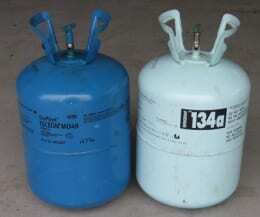Unfortunately due to the unavailability of RS24 gas we are unable to offer this conversion!
Air Conditioning - The R134a conversion myth
You do NOT need to have your air conditioning system converted to R134a gas!
There are several drop-in R12-equivalent gases which are legal and easily obtainable. We use RS24, also known as Isceon MO49 or R413. It’s 50% more expensive than R134a. Contact KWE to get the latest re-gas pricing.
Refrigerant Gas Facts:
- Older cars used R12 refrigerant which is very effective but when released into the atmosphere it depletes ozone and hence has been banned some years ago.
- R134a is a non-ozone-depleting gas which is cheap and widely available. It is a less effective refrigerant than R12.
- R134a-converted refrigeration systems need several different components: The expansion valve needs to have a different orifice, the receiver dryer needs to have a different desiccant, the hoses need to be renewed and lined in PTFE or similar (R134a is more inclined to leak), the refrigerant oil needs to be changed to PAG or Ester and the Harrison A6 compressor may struggle a bit.
- To achieve the same cooling, R134 systems run at higher pressure which may stress and cause leaks in the hoses.
- There are several R12-compatible gases which are non-ozone depleting and hence fully legal – and easily obtained – such as RS24.
- RS24 gas may be installed using simple gauges and often with twin-gas automatic systems.
- There is no need to convert any components from an R12 system to use RS24 (though it’s always desirable to replace the receiver dryer which is a service item regardless of gas used)
- RS24 and R12 give typically 6 deg C cooler air at the face vent than R134a

In practice, R134a was heavily promoted by manufacturers such as Dupont when R12 was banned and garages were encouraged to buy new equipment and stock only R134. On top of this, virtually all new cars from about 1994 were fitted with R134 a/c systems. So most garages didn’t bother to consider older cars, and instead made money out of unnecessarily converting old systems to R134.
This was (and still is) often done very badly, for example, not changing the hoses so the gas leaks out quickly, not changing the oil so the system clogs and compressors fail early etc.
If you found this article helpful please hit the like button below to let us and others know.
